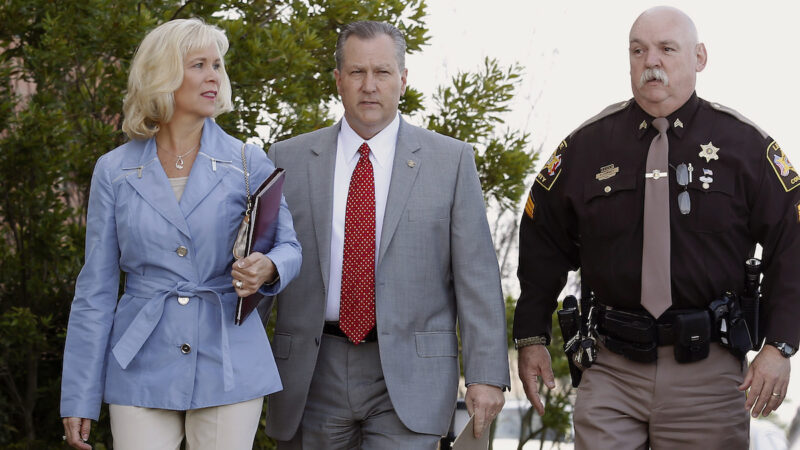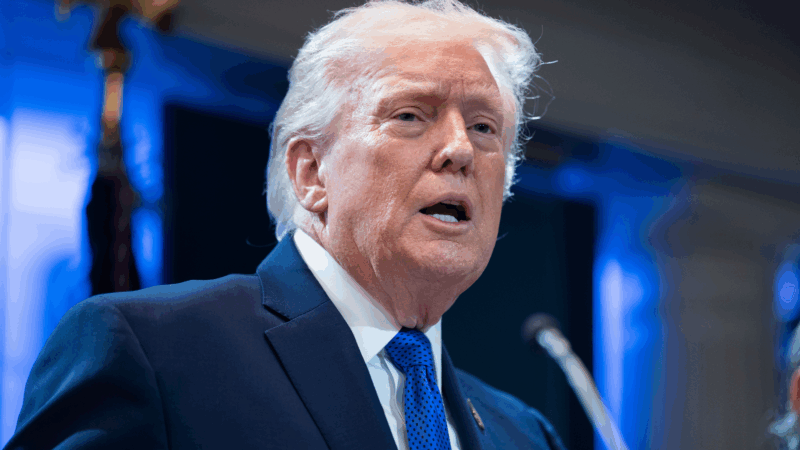State: Ex-speaker Hubbard’s words show apology was insincere
This photo from 2016 shows former Alabama Speaker Mike Hubbard and his wife, Susan Hubbard, walking to the Lee County Justice Center for his ethics trial.
MONTGOMERY, Ala. (AP) — Convicted former Alabama House Speaker Mike Hubbard told people he was innocent and “held my nose” as he signed a letter apologizing for his crimes, according to state prosecutors who used Hubbard’s own phone calls and emails from prison to cast doubt on his claims of remorse as he seeks early release.
The attorney general’s office combed through emails and 600 of Hubbard’s phone calls from prison and cited some of the conversations as they oppose his request for early release from prison. State attorneys said the communications show he was “not truthful” when he signed a letter apologizing for his 2016 conviction for violating state ethics law, including using his public office for personal financial gain.
Hubbard submitted the letter in September along with a request for early release from prison. In the letter, Hubbard said, “I recognize and admit my errors.” Hubbard wrote that his conviction embarrassed the state and his family and “for this, I am severely sorry and respectfully ask forgiveness from everyone affected.”
According to the Monday court filing, Hubbard told a friend before submitting the apology letter that, “I promise you I did nothing wrong.” On the day he signed the apology letter to the court, Hubbard told his wife that part of the letter he liked was removed, but he was “looking at the ultimate goal” and “held [his] nose and signed it.”
Prosecutors said Hubbard also talked to friends about efforts to add language to a community corrections legislation that could benefit his release. According to state lawyers, Hubbard told an attorney that someone should contact a state senator to urge a filibuster. The court filing did not include many specifics but said that Hubbard did not get his wish.
“Hubbard has already been removed from office for breaching his duty to the public. Now he has been caught breaching his duty to this Court. He deserves condemnation, not mercy,” state attorneys wrote.
The former House speaker also referred to the lead prosecutor in his case as corrupt, suggested politics was behind his prosecution and was baffled that the Alabama Supreme Court did not completely overturn his conviction.
“I hope the folks there know I didn’t do anything wrong, and this was just a political hit job,” Hubbard told one friend according to the court filing. He told another that, “according to the way they’ve interpreted the law, they could indict and convict anybody in the Legislature who has a job.”
Phone calls made by prisoners have a message at the beginning informing recipients that the call may be monitored. State lawyers said Hubbard must have been aware of this because he used a variety of code names such as calling his wife the quarterback and state officials either Martians or the Taliban.
Hubbard has served about one year of a 28-month sentence. He is imprisoned at Limestone Correctional Facility.
Prosecutors accused Hubbard of leveraging his powerful public office to obtain clients and investments for his businesses, violating the prohibition against giving a “thing of value” to an elected official. His defense maintained the contracts were legitimate work and unrelated to his position as House speaker.
In upholding the conviction this spring, justices noted that when contacting a company for one client, Hubbard “identified himself as a state legislator and as Speaker of the House of Representatives.” They also noted how one company executive wrote in an email that Hubbard could get the company, “in front of any speaker in the country regardless of party.”
The Republican was one of the state’s most powerful politicians until the ethics conviction in a corruption case ended his political career. Hubbard, the architect of the GOP’s takeover of the Alabama Legislature in 2010, was a legislator from Auburn and former chairman of the Alabama Republican Party. He was elected House speaker soon after Republicans won control.
Mississippi health system shuts down clinics statewide after ransomware attack
The attack was launched on Thursday and prompted hospital officials to close all of its 35 clinics across the state.
Willie Colón, salsa pioneer, has died at 75
The South Bronx bandleader took the Latin genre to new heights while recording for Fania Records.
Vietnam Veterans sue to block proposed ‘Independence Arch’ near Arlington National Cemetery
The lawsuit challenges President Trump's plans for "Independence Arch," a 250-foot structure proposed for Memorial Circle.
Trump to raise global tariffs to 15%
President Trump previously said he would implement 10% global tariffs after the U.S. Supreme Court struck down his tariff policies.
Pin trading has taken over the Olympics. Here’s what it’s like in Milan
Pin trading has become a hallmark of the Olympics in recent decades — and not just for athletes. An official trading center in Milan was a hotspot for longtime collectors and curious newcomers alike.
US military airlifts small reactor as Trump pushes to quickly deploy nuclear power
The Pentagon and the Energy Department have airlifted a small nuclear reactor from California to Utah, demonstrating what they say is potential for the U.S. to quickly deploy nuclear power for military and civilian use.






